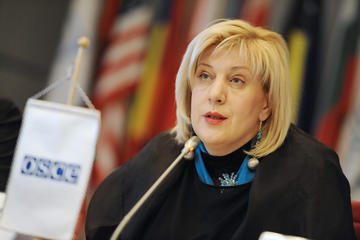
The OSCE Representative on Freedom of the Media, Dunja Mijatović welcomed the UN Security Council’s passing today of Resolution 2222 on the protection of journalists
Link: OSCE
“With this Resolution, the UN Security Council puts focus on a very important issue for media freedom,” Mijatović said. “We are witnessing attacks on members of the media every day and states need to do more to improve journalists’ safety.”
Resolution 2222 was unanimously adopted by the UN Security Council on 27 May, condemning all violations and abuses committed against journalists, media professionals and associated personnel in situations of armed conflict. The Resolution, put forward by Lithuania, also calls upon all parties in armed conflict to bring an end to such practices.
“The situation for journalists reporting from conflict zones around the world is especially worrisome when it comes to journalists’ safety. Joint international efforts like today’s UN Security Council Resolution are crucial to raising awareness on this issue,” Mijatović said.
On 15-16 June, the Office of the OSCE Representative on Freedom of the Media will organize a conference to examine and review the current situation relating to the safety of journalists reporting from conflicts. More information about the conference is available at www.osce.org/fom/151466.
Mijatović is in New York participating in a panel discussion at the UN on the protection of journalists. The panel discussion “Protection of journalists and media freedom - key to sustainable future” is hosted by the Lithuanian Minister of Foreign Affairs Linas Linkevičius and Latvian Minister of Foreign Affairs Edgars Rinkēvičs.
The OSCE Representative on Freedom of the Media observes media developments in all 57 OSCE participating States. She provides early warning on violations of freedom of expression and media freedom and promotes full compliance with OSCE media freedom commitments. Learn more at www.osce.org/fom , Twitter: @OSCE_RFoM and on www.facebook.com/osce.rfom .
This publication has been produced within the project European Centre for Press and Media Freedom, co-funded by the European Commission. The contents of this publication are the sole responsibility of Osservatorio Balcani e Caucaso and its partners and can in no way be taken to reflect the views of the European Union. The project's page

 OSCE Representative lauds UN Security Council Resolution on protection of journalists
OSCE Representative lauds UN Security Council Resolution on protection of journalists




 All the contents on the Osservatorio Balcani e Caucaso website are distributed with a
All the contents on the Osservatorio Balcani e Caucaso website are distributed with a 